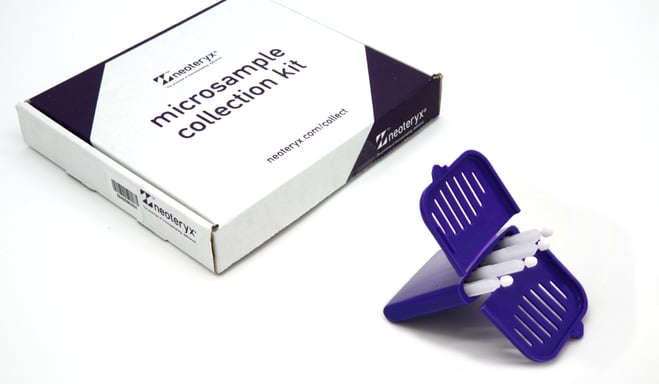Share this
What is serology research and why are blood samples important?
by Neoteryx Microsampling on Oct 18, 2021 9:00:00 AM

The emergence of the COVID-19 pandemic has introduced the public to new terms like “serology.” The general assumption is that serology is used to test if someone is COVID-19 positive with an active infection, but this isn’t necessarily true. Serology tests are performed in a lab and are used to determine if the body has developed antibodies after an infection.
Let’s examine what a serology test is and why it’s necessary for research studies of SARS-CoV-2, the virus that causes COVID-19 illness, and other contagious diseases.
What Is Serology?
Serology is the scientific study of blood serum particularly regarding the body’s immune response to pathogens, or foreign invaders. It focuses on:
- Identifying antibodies – Antibodies are proteins produced by a specific type of white blood cell in response to foreign substances in the body.
- Investigating immune system problems – Sometimes the body’s immune system doesn't respond appropriately to fight a pathogen, and instead has an inflammatory response that causes more severe illness or complications, and/or the immune system overreacts and attacks the body's tissues, as can happen in autoimmune disorders.
It’s important to understand how the immune system functions. Generally, the immune system produces antibodies when it detects the presence of foreign invaders (antigens) in the body.
- Antigens are molecules or molecular structures that may be on the outside of a pathogen. They enter the body through nasal passages, broken skin, or the mouth and can be in the form of viruses, bacteria, fungi, parasites, or chemicals.
- The presence of antigens in the body usually triggers an immune response. In healthy individuals, the immune system tries to defend itself by producing antibodies that attach to the antigens to deactivate them.
Scientists and healthcare professionals use blood samples to identify diseases or to track a person's recovery from past diseases, and to determine the types and levels of antibodies and antigens in a person's system.
What Is a Serology Study?
Research labs can use serology tests of blood samples to determine the type of antibodies present after a person has recovered from an illness or received a vaccine. The immune system produces different types of antibodies in response to different vaccines or various infections. A person's body might also develop different levels of antibodies based on the severity of their illness or based on which vaccine they received, for example.
Different types of serology tests can be performed in the research lab, including neutralization tests, hemagglutinin-inhibition tests, enzyme-linked immunosorbent assays (ELISAs), and chemiluminescence immunoassays.
What Serology Studies Reveal in the Context of COVID-19
In addition to using the PCR method of diagnostic testing using oral or nasal fluids to find out if people are COVID-19 positive (actively infected), it’s important to conduct serology tests after they recover to determine if they have developed antibodies against reinfection. Antibody testing is only possible through blood samples and serology studies.
A COVID-19 serology test detects the presence of antibodies in the blood in response to the SARS-CoV-2 virus. Serology tests also overcome the limitations presented by PCR-based tests. Here some key differences between blood samples (for serology tests) and nasopharyngeal samples (for PCR tests):
- It takes time for the body to develop an immune response to an infection. Therefore, blood sampling should be conducted after a person has fully recovered from an infection, or the antibodies may not yet be detectable in their blood sample.
- PCR-based tests rely on capturing and detecting the active virus; it’s not possible to determine past infections with these types of nasal/oral swab tests.
- A PCR-based test can only tell if a patient is currently infected with coronavirus; not other diseases.
- The results of a PCR-based test are simply positive or negative, while a serology test provides a positive/negative, plus more specific data about which antibodies are present and if they might provide some immunity.
Positive Antibody Tests
A positive test result on a SARS-CoV-2 antibody test indicates you were recently or previously infected with COVID-19 (whether your body exhibited symptoms or not).
Sometimes positive serology results can be wrong, resulting in a false-positive. While such scenarios are rare, this can be due to:
- Antibody tests that detect coronaviruses other than SARS-CoV-2
- Testing in populations with high numbers of COVID-19 infections
Note that a positive antibody test doesn’t mean you’re fully immune to the SARS-CoV-2 virus or have a lower chance of infecting other people. The presence of SARS-CoV-2 antibodies in your blood implies that you were exposed to the virus, and may have some degree of immunity against it to prevent a reinfection. It's also important to note that antibody levels in a person's system can diminish over time, reducing a person's degree of immunity against reinfection. Studies indicate that SARS-CoV-2 antibodies remain in the system between 6-8 months after infection or vaccination, which is similar to the timeline of Influenza antibodies.
Researchers use this information to trace when and where you were exposed, monitor the spread of infection in communities, and understand where undetected cases might have occurred.
Negative Antibody Test
A negative result implies no antibodies were detected in the sample. It could indicate:
- You haven’t been infected with the COVID-19 virus previously.
- You were infected with the virus in the past but didn’t develop or have not yet developed detectable antibodies. You may need another blood test at a later date.
A negative antibody test also can occur when you’ve been tested immediately after getting infected with the SARS-CoV-2 virus. This is because the body takes at least two to three weeks to develop detectable antibodies.
How Serology Tests Are Performed
Serology tests are performed using blood or plasma samples. Venipuncture, whereby a vein in the arm is punctured with a needle, has been the traditional method of collecting liquid blood samples in vials or tubes.
However, venipuncture is invasive, and has some challenges. It can cause pain, anxiety, and excessive bleeding. It also requires professionals (phlebotomists) to perform the blood collection, typically in a lab or clinical setting.
These challenges and limitations have spurred researchers to embrace alternative and less invasive blood collection methods that can be performed remotely, such as microsampling.
Microsampling is the collection of small blood samples (usually 10-20 microliters of blood) from a fingerstick using either dried blood spot (DBS) or volumetric absorptive microsampling technology.
Novel specimen collection devices like the Mitra® device and the Mitra® Collection Kit have been developed to facilitate volumetric absorptive microsampling, which is especially suitable for at-home sampling or studies conducted in remote areas. Unlike traditional blood collection methods, microsampling allows remote blood collection to be performed by the study volunteers themselves, without professional assistance.
Today, scientists can send Mitra Collection Kits to study participants living in geographically diverse areas. Study participants can easily mail their samples back for analysis using the regular postal system. This remote approach to blood sample collection has proved to be effective in recent serology research studies that promote our understanding of SARS-CoV-2. Due to its recent successes as a viable sampling approach, remote microsampling is likely to be conducted in more serology research studies in the future.
Share this
- Microsampling (206)
- Research, Remote Research (119)
- Venipuncture Alternative (105)
- Clinical Trials, Clinical Research (83)
- Mitra® Device (73)
- Therapeutic Drug Monitoring, TDM (51)
- Dried Blood Spot, DBS (39)
- Biomonitoring, Health, Wellness (30)
- Infectious Disease, Vaccines, COVID-19 (24)
- Blood Microsampling, Serology (23)
- Omics, Multi-Omics (21)
- Decentralized Clinical Trial (DCT) (20)
- Specimen Collection (18)
- Toxicology, Doping, Drug/Alcohol Monitoring, PEth (17)
- Skin Microsampling, Microbiopsy (14)
- hemaPEN® Device (13)
- Preclinical Research, Animal Studies (12)
- Pharmaceuticals, Drug Development (9)
- Harpera Device (7)
- Industry News, Microsampling News (5)
- Antibodies, MAbs (3)
- Company Press Release, Product Press Release (3)
- Environmental Toxins, Exposures (1)
- July 2025 (1)
- May 2025 (1)
- April 2025 (2)
- December 2024 (2)
- November 2024 (1)
- October 2024 (3)
- September 2024 (1)
- June 2024 (1)
- May 2024 (1)
- April 2024 (4)
- March 2024 (1)
- February 2024 (2)
- January 2024 (4)
- December 2023 (3)
- November 2023 (3)
- October 2023 (3)
- September 2023 (3)
- July 2023 (3)
- June 2023 (2)
- April 2023 (2)
- March 2023 (2)
- February 2023 (2)
- January 2023 (3)
- December 2022 (2)
- November 2022 (3)
- October 2022 (4)
- September 2022 (3)
- August 2022 (5)
- July 2022 (2)
- June 2022 (2)
- May 2022 (4)
- April 2022 (3)
- March 2022 (3)
- February 2022 (4)
- January 2022 (5)
- December 2021 (3)
- November 2021 (5)
- October 2021 (3)
- September 2021 (3)
- August 2021 (4)
- July 2021 (4)
- June 2021 (4)
- May 2021 (4)
- April 2021 (3)
- March 2021 (5)
- February 2021 (4)
- January 2021 (4)
- December 2020 (3)
- November 2020 (5)
- October 2020 (4)
- September 2020 (3)
- August 2020 (3)
- July 2020 (6)
- June 2020 (4)
- May 2020 (4)
- April 2020 (3)
- March 2020 (6)
- February 2020 (3)
- January 2020 (4)
- December 2019 (5)
- November 2019 (4)
- October 2019 (2)
- September 2019 (4)
- August 2019 (4)
- July 2019 (3)
- June 2019 (7)
- May 2019 (6)
- April 2019 (5)
- March 2019 (6)
- February 2019 (5)
- January 2019 (8)
- December 2018 (3)
- November 2018 (4)
- October 2018 (7)
- September 2018 (6)
- August 2018 (5)
- July 2018 (8)
- June 2018 (6)
- May 2018 (5)
- April 2018 (6)
- March 2018 (4)
- February 2018 (6)
- January 2018 (4)
- December 2017 (2)
- November 2017 (3)
- October 2017 (2)
- September 2017 (4)
- August 2017 (2)
- July 2017 (4)
- June 2017 (5)
- May 2017 (6)
- April 2017 (6)
- March 2017 (5)
- February 2017 (4)
- January 2017 (1)
- July 2016 (3)
- May 2016 (1)
- April 2016 (2)



No Comments Yet
Let us know what you think